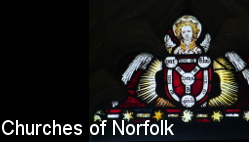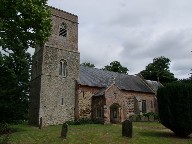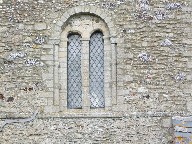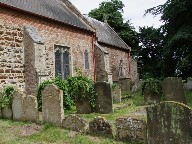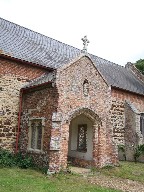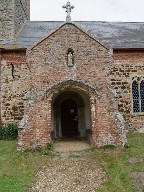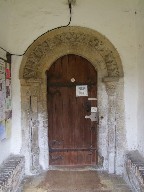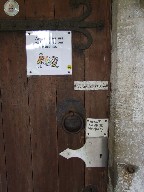| |
|
St James,
Runcton Holme
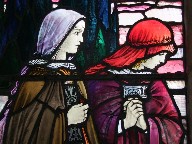 |
|
Out
here, they are working villages, and the
landscape is an ordinary agricultural one of
worked fields and lost hedgerows, with the
occasional intrigue of a secretive copse or
woodland. The main Downham Market to Kings Lynn
road threads through to the east, but Runcton
Holme is a pleasant, sizeable village with a
quietly self-sufficient air, as comfortable as
its name. The church sits in a field above the
village street. There is no reason whatsoever for
it to be kept locked, and the signs on the door
suggest that it was once left open as a place of
spiritual refreshment to pilgrims and strangers;
but those days are past, and you must collect the
key from the bungalow at the bottom of the bumpy
lane.
|
The
exterior of the church is attractive, and slightly
curious. It is largely a mixture of the three great East
Anglian materials, flint, red brick and gingerbread
carstone, but it is unusual to see them all in the same
building at once The lower part of the tower is a grand
Norman survival, an unusual sight, especially when topped
out with red brick, and with a very late medieval red
brick porch against the nave below. The porch is not
large, but seems it - this is a small church. The south
doorway gives away the fact that it is also essentially a
Norman church, and the body of the nave is older than the
tower, which is in an almost clumsy juxtaposition to it.
At some
point in the 20th Century, this church was obviously the
subject of some considerable Anglo-catholic enthusiasm,
and one of the survivals of this is a splendid window by
Veronica Whall of the Marys discovering the empty tomb on
Easter morning. It is quite her best work in East Anglia.
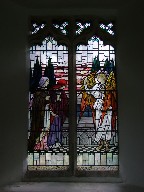 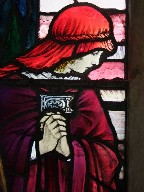 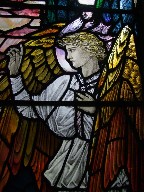 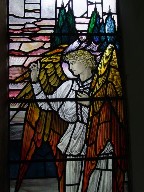
The Whall
window stands out all the more because this is a very
plain, very simple church otherwise, the fruit of an
early restoration in 1842. There are a few earlier
survivals, but not much has happened since, apart from
the window. The font is plain and simple, and probably of
the late 14th Century. There are intriguing heads looking
down from the chancel arch. The grand pulpit of the late
17th Century is supposed to have come from elsewhere. A
ledger stone from the following century notes that the
lady beneath is Safe from Life on that Eternal Shore,
where Sin and Pain and Sorrow are no more.
| St
James is a good example of a church which is,
above all, a touchstone to its parishioners down
the long generations. I came here with local
historian and writer Paddy Apling, and as we
chatted about this, I put my hand on one of the
19th Century poppyheads on the end of one of the
small benches which were put here in the 1842
restoration. I was surprised by how cold it felt,
and on closer inspection I discovered that the
poppyheads were, in fact, made from cast iron. Now, this
seems a perfectly reasonable, even sensible,
material out of which to make them, but I had
never come across this kind of thing before. Or
had I? It made me wonder if this was just the
kind of thing which I had easily missed when
being too dismissive of a workaday Victorian
restoration. I will have to look more carefully
in future.
|
|
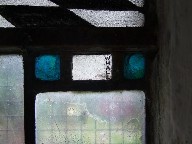 |
|
|
|
